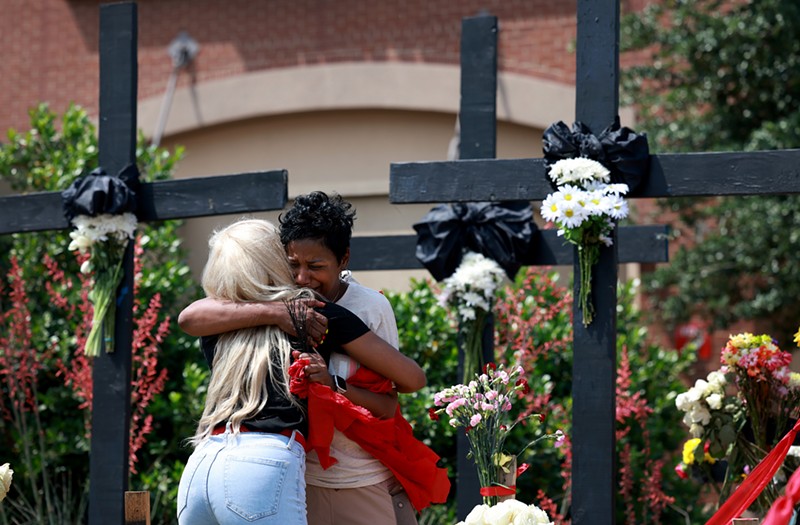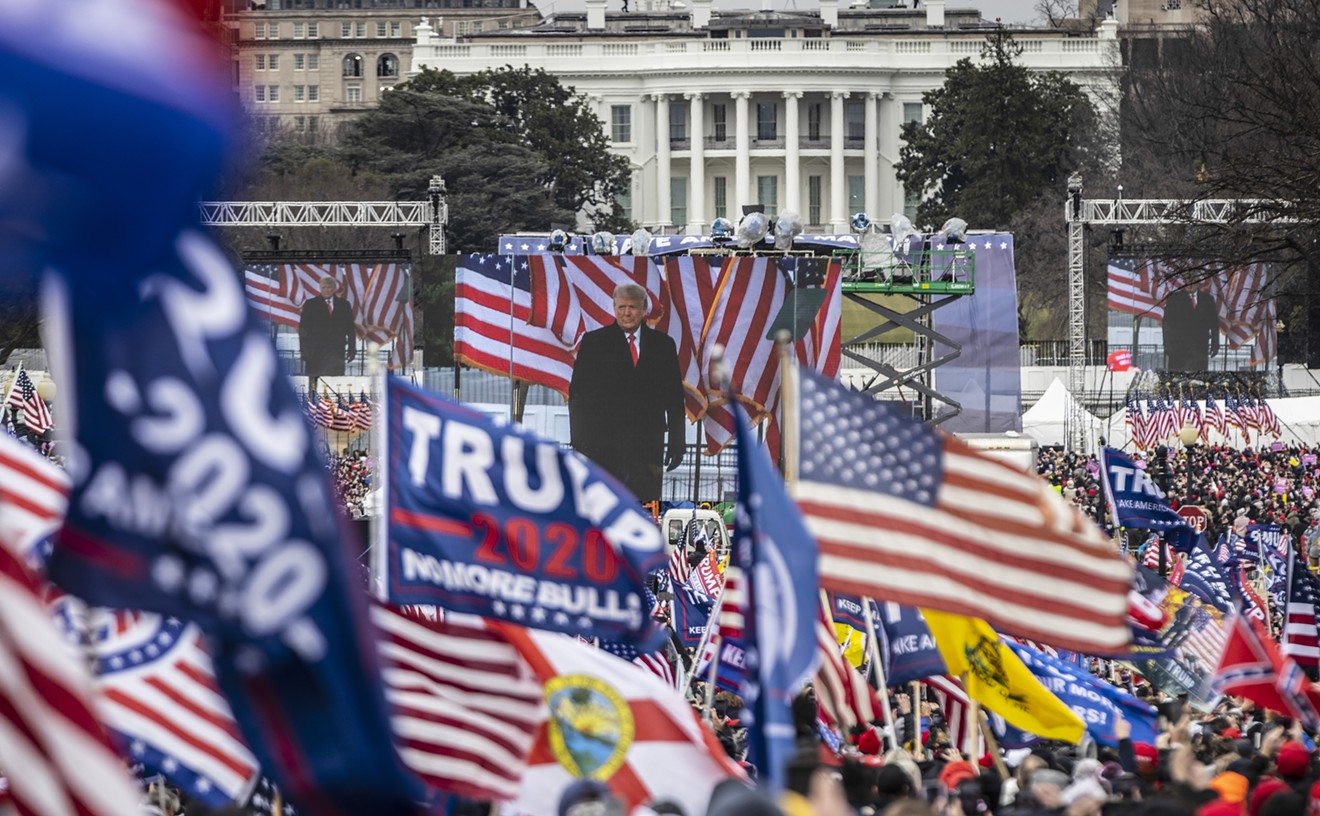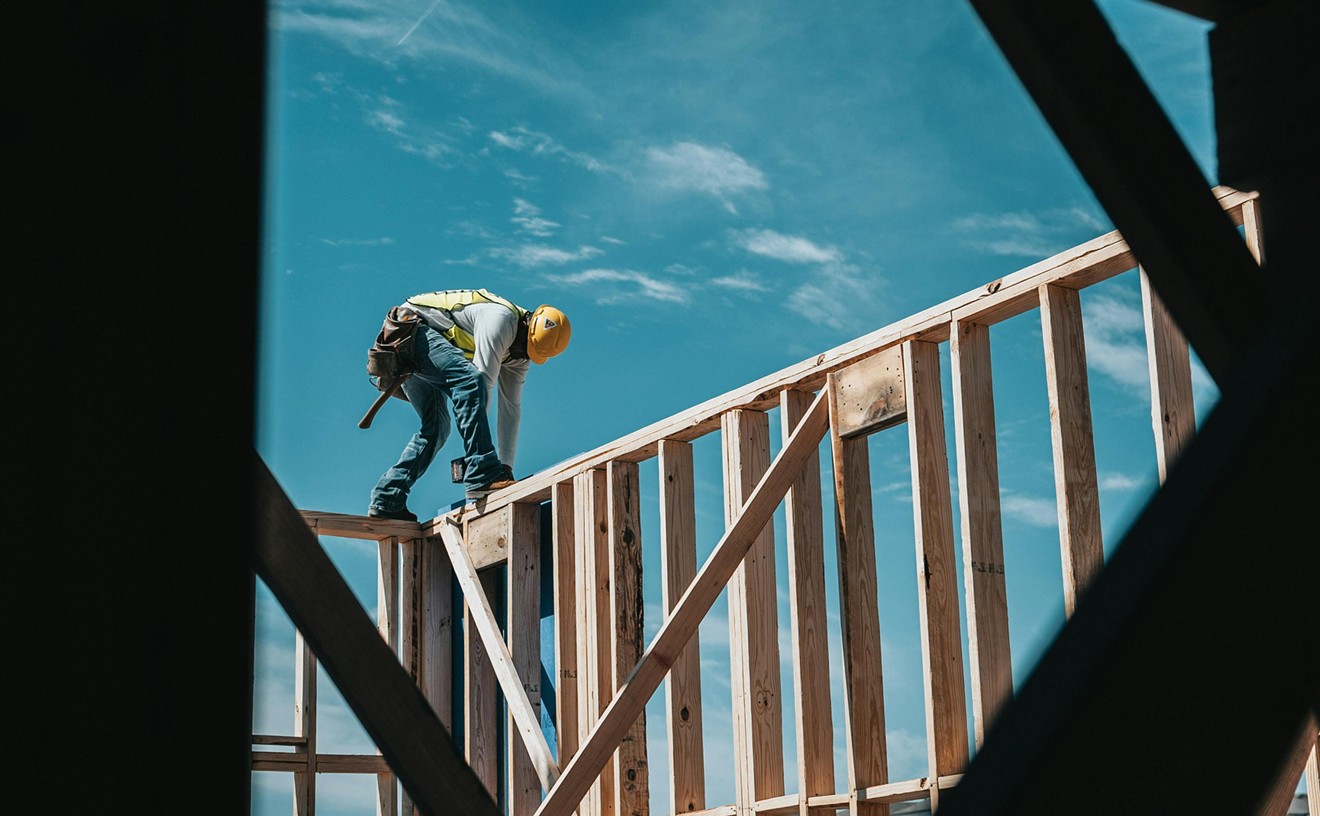Among the attendees was a store manager who survived the shooting, an Asian woman who was petrified by the shooter’s apparent hate-driven motive and a local woman, Bobbie Jo Hall, who hoisted a sign bearing a backpack, children’s T-shirt and stuffed animal. All of the items were painted red.
“Our children are dying, and this is very rough,” Hall told The Dallas Morning News.
State Rep. Mihaela Plesa, a Democrat, was also at the park. To her, it was clear what voters must do:
Jettison the GOP.
“They have not passed any bill to keep us safe,” Plesa told the audience.
She was referring to the several laws passed by the Legislature following shootings in Sutherland Springs, Santa Fe and El Paso. The most controversial of those is known as permitless carry: It allows anyone 21 years or older to carry a handgun in public without need for a permit or training.
Plesa, a staunch gun control advocate, was not deterred.
Interspersed between chants of “Vote them out,” she told the crowd she had no plans to stop the fight for tighter laws.
"You guys give me strength to go back and keep fighting," she said.
Nearly a year later, her fight continues.
Plesa serves District 70 in the Texas House, and she is just one of many Texas Democrats who have made gun control a central part of their identity in recent years. Among the candidates in this year’s race for the U.S. House seat currently held by Senate candidate Colin Allred are Julie Johnson and Dr. Brian Williams. Johnson, a member of the Texas House, was part of the mass violence prevention committee formed by the Legislature after the El Paso shooting; Williams is a trauma surgeon who operated on seven wounded police officers after the July 2016 shooting in downtown Dallas.
Despite the widespread popularity of many of these politicians’ proposed policies among voters from both parties, the path toward tighter gun control remains elusive. During her first session in the House, Plesa, who describes herself as “a proud gun owner,” filed three bills focused on gun safety. One of the bills would have made it illegal to sell a firearm to someone you know is legally prohibited from possessing a firearm.
None of the bills received a hearing.
“The answer is clear: We have to get more Democrats in the House,” Plesa told the Observer in early February, echoing her comments from the park in Allen last May. “Then,” she added, clutching hard copies of her three bills, “we can start passing some of these laws.”
It might not be that simple.
As explained by Brandon Rottinghaus, a political science professor at the University of Houston, the structure of the Legislature is not conducive to rapid responses of any kind — particularly those that are in demand after a mass shooting.
“Political institutions aren't designed to move quickly to solve problems; in fact, quite the opposite,” he says. “That's why bills take multiple sessions to pass.”
That leaves Democrats little choice but to keep trying.
For instance, after an 18-year-old used an AR-15-style rifle to kill 19 elementary school students and two teachers in Uvalde in 2022, Democratic state Sen. Roland Gutierrez tried to raise the legal age to purchase an AR-15.
He was unsuccessful.
“There's not much middle ground on guns,” Rottinghaus says, “and that means you're not likely to see significant legislation.”
Even talking about stricter gun laws presents major challenges. Rather than “gun control,” Democrats like Plesa use terms such as “gun safety.”
“We don't call building codes ‘builder control’ or traffic safety laws ‘driver control,’ because it's not about control,” says Kathleen Thompson, the executive director of the media organization Progress Texas. “It's just common sense public safety.”
Thompson has experienced firsthand the terror and panic that the lack of gun safety can create. She has three kids, and over the last two years, she has received multiple alerts from her sons’ high school that a gun has been found on or near campus, leading to a lockdown. On all three occasions, the responsible party was a student or group of students who brought their family’s gun to campus — or posted about it on social media — in an apparent effort to show off.
This is why Thompson is grateful for the gun storage campaign led in part by the Department of Public Safety. She argues that safe storage can save lives and curb firearm fatalities in Texas, which, in 2023, reached a near three-decade high.
Of course, Thompson wants to see laws changed, too. Her organization uses a variety of media resources to, in her words, “keep voters engaged” on issues like gun safety even during off-cycle years.
Those efforts can be vital.
“Uvalde happened right in the middle of the gubernatorial race, and for a moment, it looked like the Democrats were going to have the moral and political edge,” says Rottinghaus. But, he adds, “people are anesthetized to mass shootings because they happen so frequently.”
To be sure, Democrats have notched some wins in this fight. In 2021, state Sen. César J. Blanco’s “lie and try” bill made it illegal to lie on a background check form in an attempt to purchase a firearm.
“Political institutions aren't designed to move quickly to solve problems; in fact, quite the opposite.” – Brandon Rottinghaus, University of Houston
tweet this
Still, larger reforms remain out of reach.
Plesa, Johnson and Williams all want to raise the legal age for purchasing a gun from 18 to 21. In 2023, a University of Texas at Austin poll found that 76% of voters — including 64% of Republicans — agree the age requirement should be raised. A “raise the age” bill made some unexpected progress late in the 2023 Legislative session but ultimately stalled out.
But as Rottinghaus points out, there’s a “disconnect” between the polls and voting behavior:
Republican voters may agree in theory that raising the age limit is a good idea, but that doesn’t necessarily mean they will base a vote on that particular issue.
Democrats aren’t off the hook, either. In 2021, several Democratic lawmakers in Texas voted for the permitless carry bill.
For some, the answer likely won’t be found at the state level. Johnson, who defeated Matt Rinaldi for a Texas House seat in 2018, says her decision to now run for Congress was motivated in part by the potential to change federal laws, thereby effectively overruling the Texas Legislature.
"I’ve been in the belly of the beast for three terms, and it's clear to me these issues must be solved on a federal level,” she tells the Observer. She was angry at Republicans who, in her experience, “refused to move the needle at all” on gun control.
“What it tells me is Democrats need to win some elections, or we need to pass some federal laws.”
Winning general elections in Texas is proving increasingly challenging, she noted, as a result of what she called “extreme partisan gerrymandering.”
In fact, Plesa was the first Democrat to win a House seat in Collin County in several decades, and her slim victory (by fewer than 1,000 votes) was aided by redistricting.
Local Democratic strategists like Liz Michel see Plesa as the blueprint, though.
“She's in the southwestern part of the county, which is the bluest, but that area has filled up now, so where are those people going?” Michel says.
Michel is the chair of recruitment and training for the Collin County Democratic Party, a volunteer role in which she helps candidates hone their public speaking skills and sharpen their understanding of the legal process. She got involved in local politics after Trump’s election in 2016. After the Allen outlet mall shooting, she attended a candlelight vigil where she says Republican lawmakers like state Rep. Jeff Leach were acknowledged and applauded.
“I was taken aback by that,” she says. “It was gross.”
Nevertheless, she is encouraged by what she sees as North Texans pushing back against extremism. She embraces small wins like the recent McKinney school board elections, in which voters rejected candidates backed by Patriot Mobile Action, a far-right organization that has been successful in electing its chosen candidates to several Texas school boards.
To Michel, this is proof that Collin County isn’t ready to fully surrender to the right. She says it also helps that the area is becoming more diverse.
“Democrats can win in Collin County when we all show up to vote,” she says. “We have to focus on registering new voters because of the growth in Collin County. We have more Democrats moving into Collin County; we have more Democrats moving into McKinney.”
Michael Phillips, another Collin County resident and a historian, is eager to talk about what he sees as an overlooked connection between North Texas racism and gun violence. The Dallas suburbs have been a hotbed for white supremacist rhetoric and the “Great Replacement Theory,” he says.
In 2016, after Trump’s victory and around the same time Michel was getting involved in politics, several homeowners in McKinney’s Craig Ranch neighborhood received flyers on their doorsteps describing Trump as “God’s gift to [a] white nation.”
“We need to get rid of Muslims, Indians, Blacks and Jews,” the letter read.
Now, echoes of those flyers can be found in mailers sent in competitive House districts in Houston and San Antonio (just one year after the House welcomed its first two Muslim members) and in mailers being sent to some Collin County voters.
The Texas Family Project, an organization that claims to be forming a “political cavalry of pro-family forces,” is distributing mailers asking North Texans, “Did you vote for the most Muslim session in Texas history?”
“Jeff Leach did,” the mailer notes.
These recent letters are part of a campaign strategy bankrolled by conservative political operators who have deemed certain politicians (like Leach) insufficiently conservative. To Phillips, they are also symptomatic of the hatred that has seeped into North Texas politics and society. All the more reason, he says, to host a public forum on racism and gun violence.
“I understand the anger and the frustration and the distrust of law enforcement, but they are not the problem.” – Dr. Brian Williams, Democratic candidate for the U.S. House
tweet this
Dr. Brian Williams, one of Johnson’s competitors for Allred’s U.S. House seat, also believes that the connection between racism and violence must be emphasized.
Williams first gained statewide recognition for an emotional press conference after the downtown shooting in July 2016. Three of the seven officers who came under his care on that summer night died.
“I understand the anger and the frustration and the distrust of law enforcement, but they are not the problem,” he said, holding back tears in front of reporters and camera crews. “The problem is the lack of open discussions about the impact of race relations in this country. And I think about it every day, that I was unable to save those cops when they came here that night. It weighs on my mind constantly. This killing, it has to stop. Black men dying and being forgotten. People retaliating against the people that were sworn to defend us. We have to come together and end all this.”
If elected, Williams says he will bring diverse voices — including survivors and policy experts — into the fold of the gun control discussion. He also wants to tackle what he calls “low-hanging fruit” such as a universal background check, reinstating the assault weapons ban and raising the age limit for purchasing a gun — all of which, while difficult, will be easier sells at the federal level than in Texas.
It also won’t be Williams’ first brush with policy. Sen. Chris Murphy, a Democrat from Connecticut, added Williams to his team during the writing and negotiations of the Bipartisan Safer Communities Act, the legislation passed on Capitol Hill after the Uvalde shooting.
Rottinghaus, while noting the “progress” made possible by the bill, says he believes Murphy’s law is ultimately “as far as Republicans are willing to go right now.”
Others strike a more optimistic tone, even when it comes to the seemingly dire position in which Texas Democrats find themselves.
“The Texas Democratic party is playing the long game,” says Monisha Henly, the senior vice president of Government Affairs for the nonprofit Everytown for Gun Safety.
Like Michel, Henly is keen to champion progress even when it appears small. For her, that includes the vote by a House panel following the Allen shooting to advance a bill that echoes the bill filed by Gutierrez:
If passed, it would raise the legal age to buy a semiautomatic rifle from 18 to 21.
This time, two Republicans joined Democrats in voting for the bill’s advance.
“They're talking about the issue, they're running on the issue, they're not letting people forget,” Henley says of Democrats.











